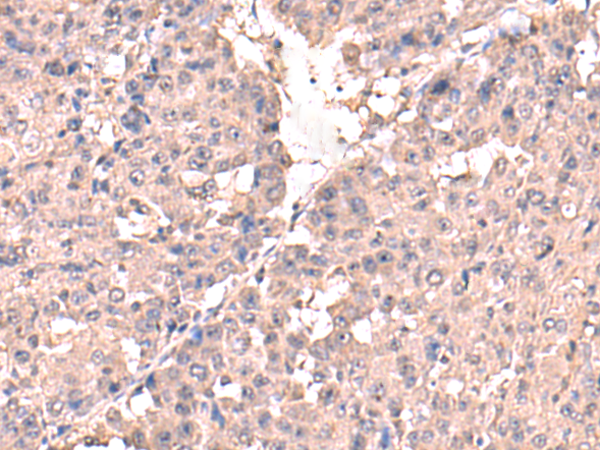
| WB | 咨询技术 | Human,Mouse,Rat |
| IF | 咨询技术 | Human,Mouse,Rat |
| IHC | 1/50-1/300 | Human,Mouse,Rat |
| ICC | 技术咨询 | Human,Mouse,Rat |
| FCM | 咨询技术 | Human,Mouse,Rat |
| Elisa | 1/5000-1/10000 | Human,Mouse,Rat |
| Aliases | TMPRSS1 |
| Host/Isotype | Rabbit IgG |
| Antibody Type | Primary antibody |
| Storage | Store at 4°C short term. Aliquot and store at -20°C long term. Avoid freeze/thaw cycles. |
| Species Reactivity | Human, Mouse, Rat |
| Immunogen | Fusion protein of human HPN |
| Formulation | Purified antibody in PBS with 0.05% sodium azide and 50% glycerol. |
+ +
以下是关于HPN(Hepsin)抗体的3篇代表性文献概览,供参考:
---
1. **文献名称**:*Hepsin-mediated cleavage of pro-hepatocyte growth factor is critical for prostate cancer progression*
**作者**:Wu Q. et al.
**摘要**:该研究揭示了HPN(一种跨膜丝氨酸蛋白酶)在前列腺癌中通过激活肝细胞生长因子(HGF)促进肿瘤侵袭转移的机制。研究团队开发了特异性HPN抗体,证实其可抑制HGF前体蛋白的切割,从而降低肿瘤细胞迁移能力,为靶向HPN的治疗策略提供依据。
---
2. **文献名称**:*Monoclonal antibodies targeting hepsin inhibit tumor growth and metastasis in preclinical models of colorectal cancer*
**作者**:Chen L. et al.
**摘要**:作者报道了一种新型HPN单克隆抗体的开发,该抗体通过阻断HPN的蛋白酶活性,显著抑制结直肠癌小鼠模型中肿瘤的生长和肝转移。研究进一步证明,HPN抗体可下调Wnt/β-catenin信号通路,提示其双重抗肿瘤机制。
---
3. **文献名称**:*Hepsin as a prognostic marker and therapeutic target in non-small cell lung cancer*
**作者**:Miao J. et al.
**摘要**:本研究通过免疫组化分析发现,HPN在非小细胞肺癌组织中高表达,且与患者不良预后相关。利用HPN中和抗体进行体外实验,证实其可抑制肿瘤细胞增殖并诱导凋亡,提示HPN抗体在肺癌靶向治疗中的潜在价值。
---
**备注**:HPN(Hepsin)抗体相关研究多聚焦于癌症诊断与靶向治疗,上述文献反映了其在抑制蛋白酶活性、调控信号通路及改善预后方面的作用。实际引用时建议通过PubMed或Web of Science核对最新进展。
**Background of HPN (Hepsin) Antibodies**
Hepsin (HPN), a transmembrane serine protease encoded by the *HPN* gene, plays critical roles in cellular processes, including extracellular matrix remodeling, cell adhesion, and signaling. Overexpression of hepsin is implicated in multiple cancers, notably prostate and ovarian cancers, where it correlates with tumor progression, metastasis, and poor prognosis. HPN antibodies are immunological tools designed to detect and quantify hepsin expression in research and diagnostic settings.
These antibodies enable the study of hepsin's biological functions, its interaction with substrates (e.g., hepatocyte growth factor), and its role in activating proteolytic cascades. In cancer research, HPN antibodies help assess hepsin as a biomarker for disease aggressiveness or as a therapeutic target. Therapeutic antibodies targeting hepsin are also under exploration to inhibit its oncogenic activity.
Challenges in HPN antibody development include ensuring specificity due to structural similarities among serine proteases and optimizing cross-reactivity across species in preclinical models. Recent advances in monoclonal antibody technology and epitope mapping have improved their reliability. Continued research aims to validate HPN antibodies in clinical applications, including targeted therapies and companion diagnostics for precision oncology.
×